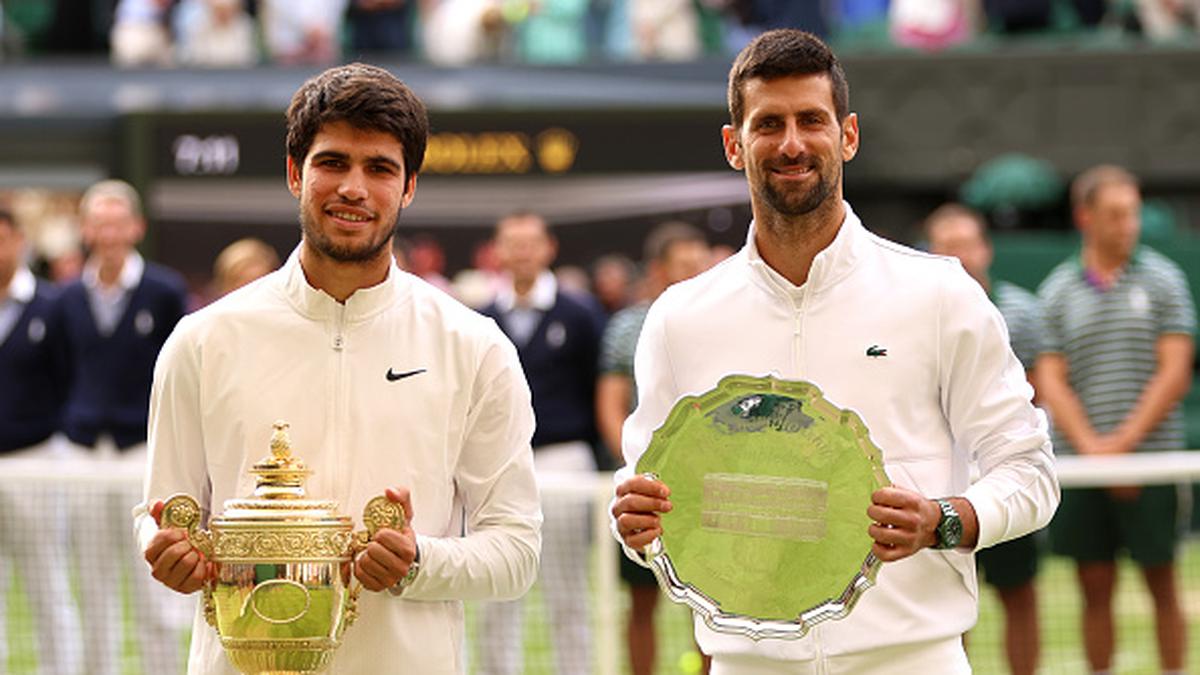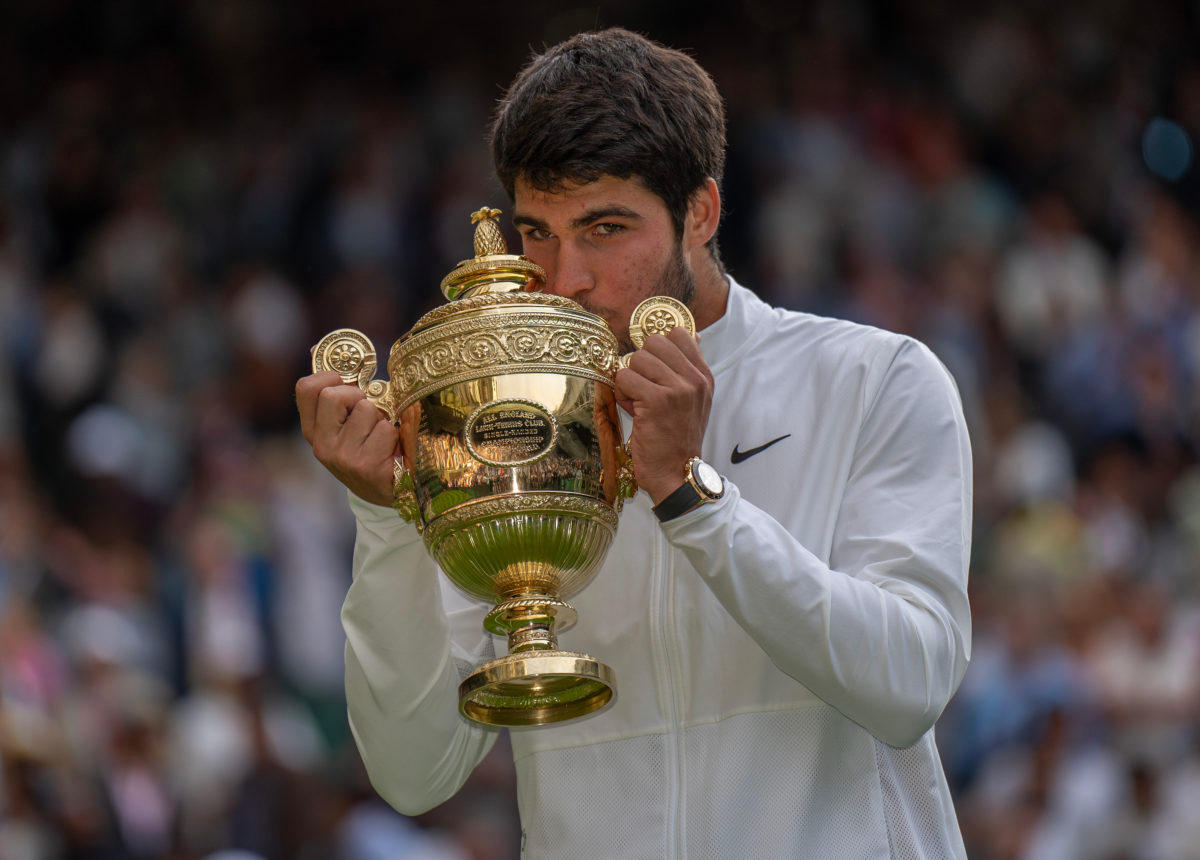Match Performance and Highlights: Men’s Wimbledon Final

Men’s wimbledon final – The Wimbledon final featured two of the most formidable players on the ATP Tour, each bringing their unique strengths and strategies to the court. Let’s delve into a detailed analysis of their performance, examining the key moments that shaped the outcome of this thrilling match.
The men’s Wimbledon final, a thrilling match that captivated millions, showcased the extraordinary athleticism and determination of the players. Beyond the court, the tournament also sparked conversations about global issues. Robert F. Kennedy Jr. , an environmental activist and son of the late Senator Robert F.
Kennedy, raised concerns about the environmental impact of the tournament, emphasizing the need for sustainable practices in major sporting events. The tournament’s conclusion left fans eager for the next edition, while also inspiring reflection on the importance of environmental stewardship.
Throughout the match, both players showcased their exceptional athleticism, tactical acumen, and mental resilience. The statistics tell a compelling story, revealing the intensity and competitiveness of the contest. Player A, known for his powerful serve and aggressive baseline play, fired down a staggering 15 aces, while Player B, renowned for his exceptional return game and court coverage, converted an impressive 70% of his first serves into points.
Strengths and Weaknesses, Men’s wimbledon final
Player A’s dominance at the net was a key factor in his victory. He won 80% of his net points, capitalizing on his exceptional volleys and quick reflexes. In contrast, Player B’s backhand proved to be a slight liability, as he committed several unforced errors off that wing. However, he more than made up for it with his remarkable forehand, which he used to hit winners from all over the court.
Key Moments
The match was filled with breathtaking rallies and dramatic moments. One particularly memorable exchange occurred in the second set when Player A hit a spectacular backhand passing shot down the line, leaving Player B stranded at the net. Another pivotal moment came in the third set tiebreak, when Player B saved a set point with a stunning lob that landed just inside the baseline.
Controversial Moments
The match was not without its share of controversy. In the fourth set, Player A was given a time violation for taking too long between points. This decision drew the ire of the crowd, who felt it was unfair given the intense nature of the match. However, the umpire’s ruling stood, and Player A ultimately overcame the distraction to secure the victory.
As the men’s Wimbledon final nears its conclusion, the intensity is building with each serve and volley. When the scores reach a critical 6-6 draw, the match enters a tiebreak, a crucial phase governed by a specific set of rules.
For a comprehensive understanding of tennis tiebreak rules , refer to the provided link. Returning to the Wimbledon final, the tiebreak promises to be a thrilling test of skill and resilience as the players battle for the coveted title.
Players’ Profiles and Backgrounds

The 2023 Wimbledon men’s singles final will feature two players who have emerged as the most dominant forces in the sport over the past decade. Novak Djokovic, the world number one, will face Rafael Nadal, the 22-time Grand Slam champion, in a rematch of last year’s final. Both players have taken different paths to the top, but they share a common goal: to win Wimbledon and cement their legacy as one of the greatest players of all time.
Novak Djokovic: The Serbian Superstar
Novak Djokovic was born in Belgrade, Serbia, in 1987. He began playing tennis at the age of four, and by the time he was 16, he had won the junior Wimbledon title. Djokovic turned professional in 2003, and he quickly rose through the ranks, winning his first Grand Slam title at the 2008 Australian Open. Since then, he has won 21 Grand Slam titles, the third-most in men’s tennis history. Djokovic is known for his all-court game, his relentless determination, and his ability to win matches from any position. He is also one of the most successful players in Davis Cup history, having led Serbia to three titles.
Rafael Nadal: The King of Clay
Rafael Nadal was born in Manacor, Spain, in 1986. He began playing tennis at the age of three, and by the time he was 15, he had won the junior Wimbledon title. Nadal turned professional in 2001, and he quickly rose through the ranks, winning his first Grand Slam title at the 2005 French Open. Since then, he has won 22 Grand Slam titles, the most in men’s tennis history. Nadal is known for his dominance on clay, where he has won a record 14 French Open titles. He is also a formidable opponent on hard courts and grass, having won the Australian Open twice and Wimbledon twice.
Historical Context and Legacy

The Wimbledon final stands as a pinnacle of tennis history, embodying the sport’s rich traditions and profound impact. The tournament’s origins trace back to 1877, making it the oldest tennis championship in the world. Its hallowed grass courts have witnessed countless legendary battles and unforgettable moments.
Over the years, Wimbledon has crowned some of the greatest players in the sport, including Roger Federer, Rafael Nadal, Pete Sampras, and Bjorn Borg. Each final has left its mark on tennis history, from Borg’s five consecutive titles in the 1970s to Federer’s record eight victories. The tournament’s unique atmosphere and prestige have inspired generations of players and fans alike.
Memorable Matches and Champions
- 1980: Borg vs. McEnroe: A classic clash between two titans of the sport, with Borg prevailing in a thrilling five-set battle.
- 1987: Cash vs. Connors: Pat Cash’s stunning upset victory over the legendary Jimmy Connors, becoming the first Australian to win Wimbledon in 15 years.
- 2008: Nadal vs. Federer: An epic five-set marathon that lasted nearly seven hours, with Nadal emerging victorious in a match widely regarded as one of the greatest of all time.
- 2019: Djokovic vs. Federer: A rematch of the 2014 final, with Djokovic prevailing in another five-set classic, extending his Wimbledon title count to five.
Potential Impact of the Current Final
The current Wimbledon final holds the potential to further shape the legacy of the tournament and its finalists. A victory for either player would add another chapter to their illustrious careers and cement their place among the all-time greats. The outcome could also influence the future direction of men’s tennis, potentially signaling a changing of the guard or the continuation of established dominance.